Abstract
The growth-inhibitory activity of two imidazole antimycotics, clotrimazole and miconazole, against Candida albicans was significantly reversed when lipid extracts from protoplast membranes of the same organism were added to the assay medium together with the drugs. Of four major classes of lipids further separated from them, viz., phospholipids, triglycerides, sterol esters, and free sterols, the former two were capable of counteracting both drugs, whereas the latter two were not. However, even with phospholipids or triglycerides, no antagonism was noted when they were saturated by catalytic hydrogenation before use. The antagonistic effect of varying classes of commercial lipids, including phospholipids, acylglycerides, sterols, and fatty acids, was also studied by means of the agar diffusion technique. Significant antagonism to both drugs was observed with: (i) phospholipids with an unsaturated acyl group; (ii) acylglycerides, the ester portion of which consists of unsaturated fatty acid; (iii) ultraviolet-activated sterols; and (iv) unsaturated fatty acids of cis-configuration. By contrast, none of the saturated phospholipids and acylglycerides nor sterols was effective as an antagonist. With the exception only of lauric acid, all of a series of saturated fatty acids and unsaturated trans-fatty acids ranging from C8 to C18 in chain length were either minimally effective or completely ineffective. Essentially, there was no qualitative difference between clotrimazole and miconazole in the response to these various lipids.
Full text
PDF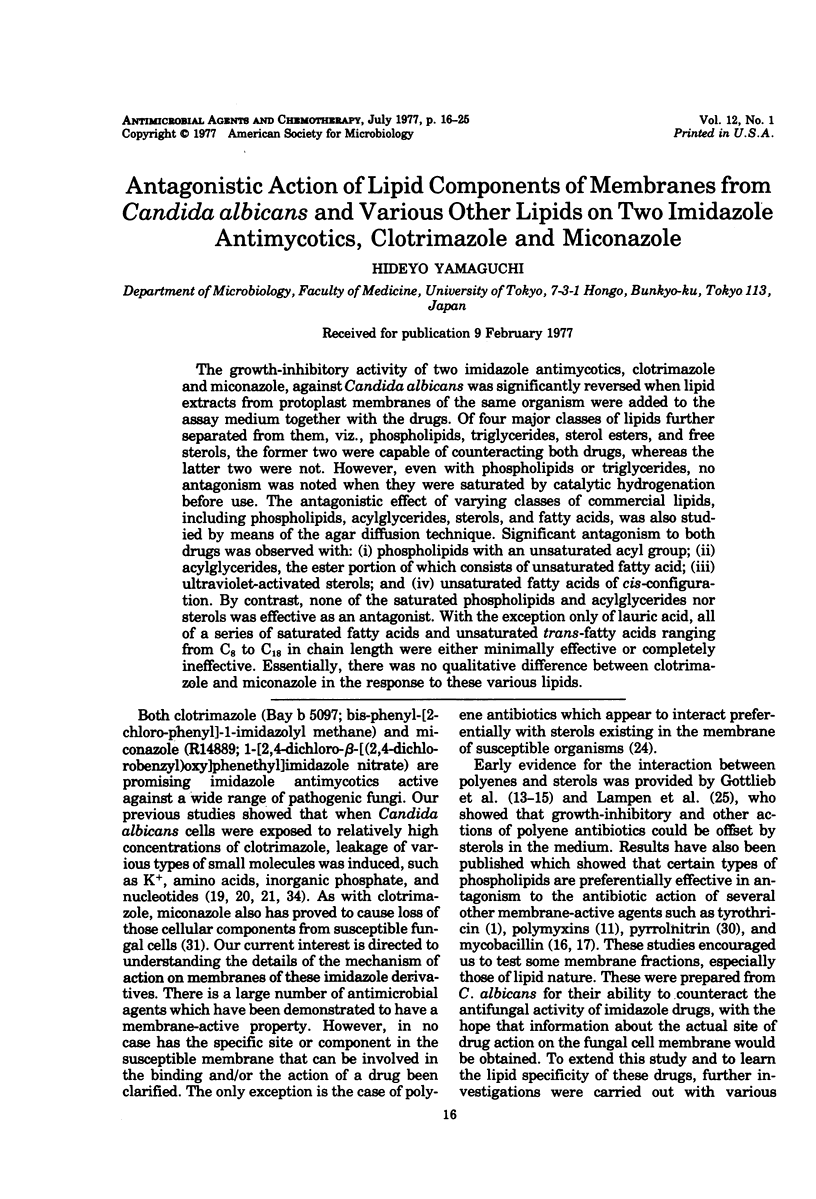
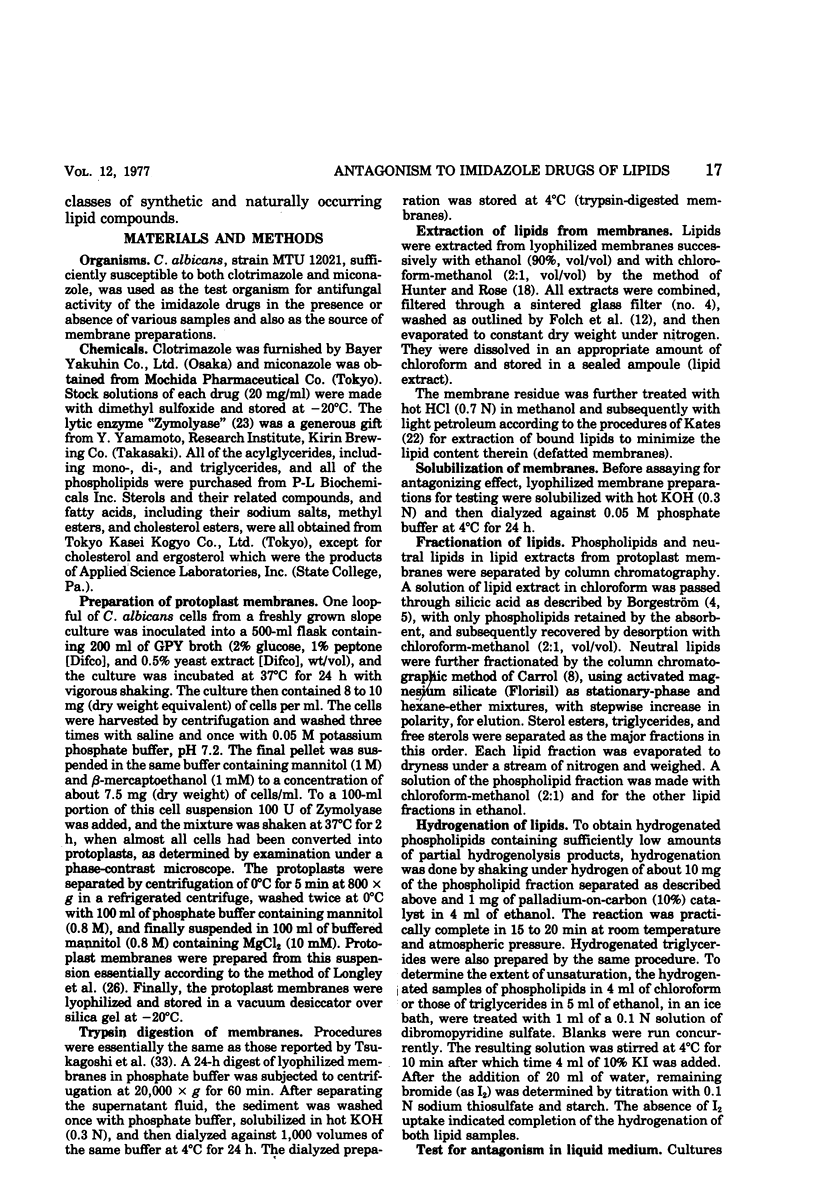
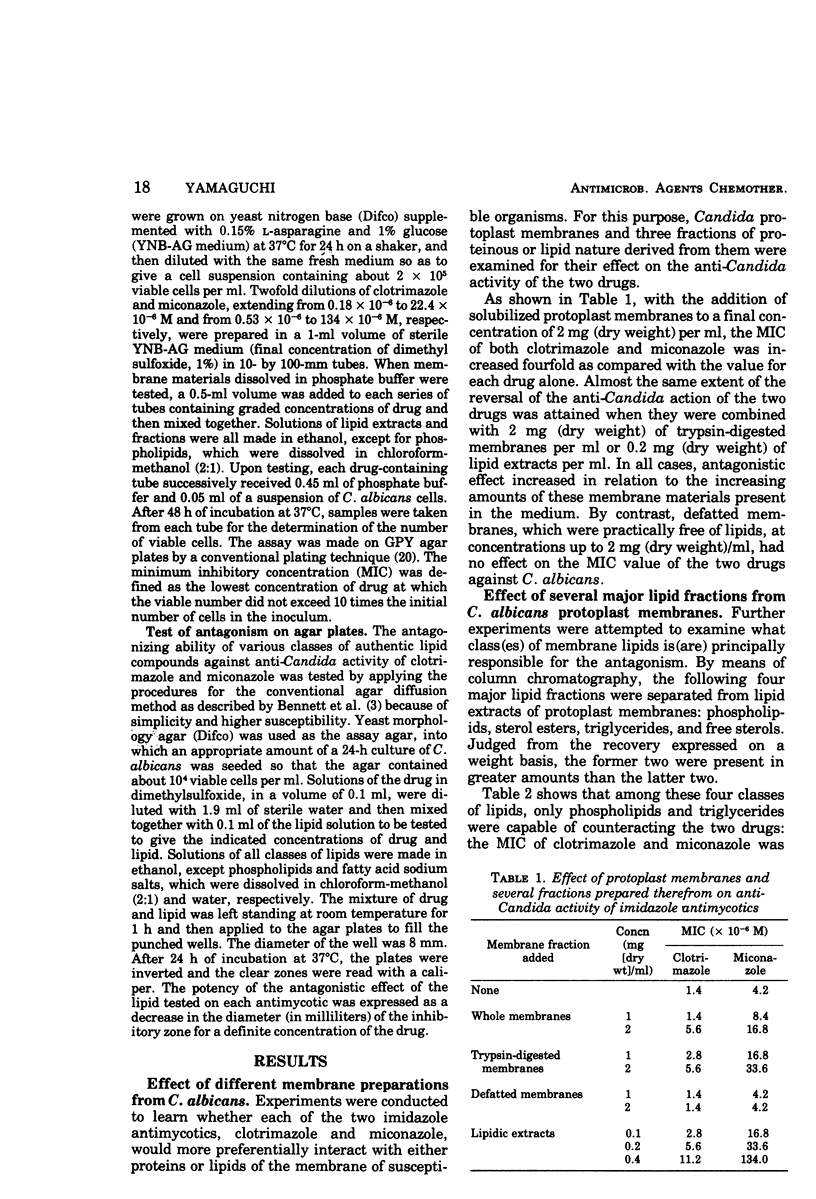
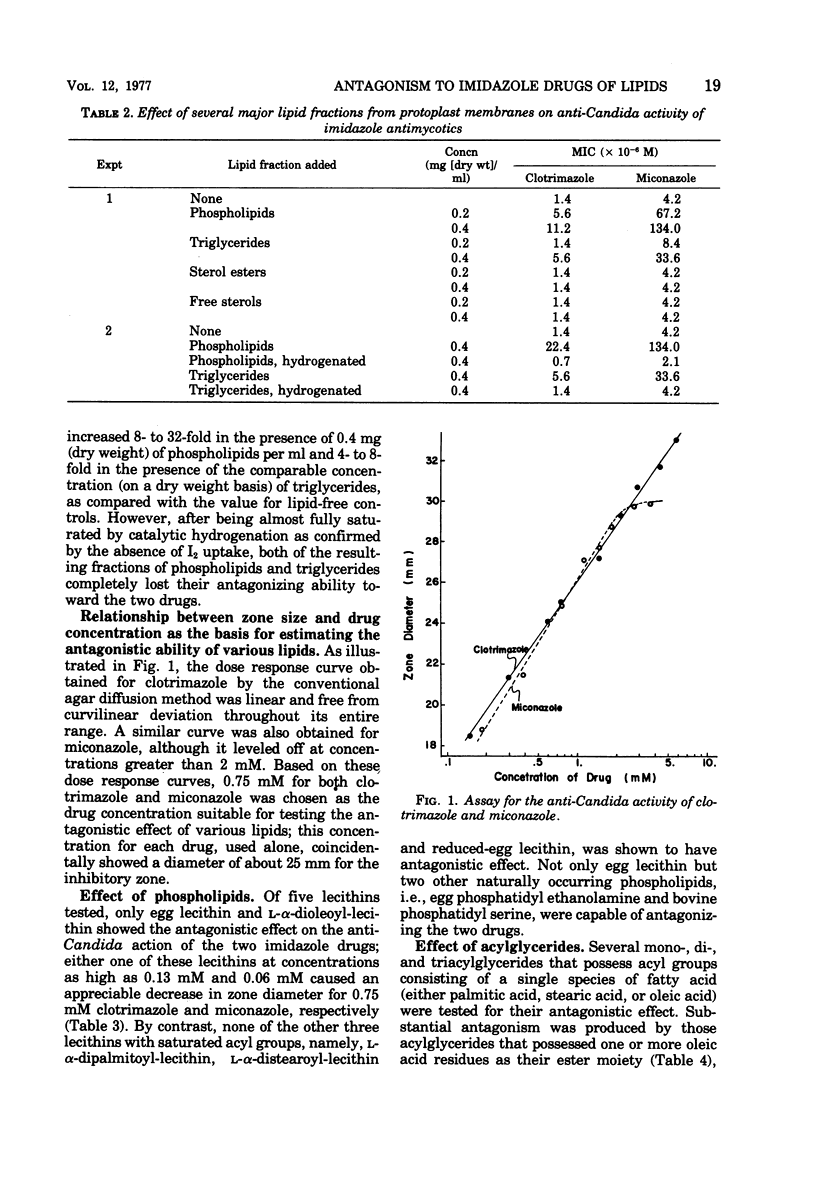
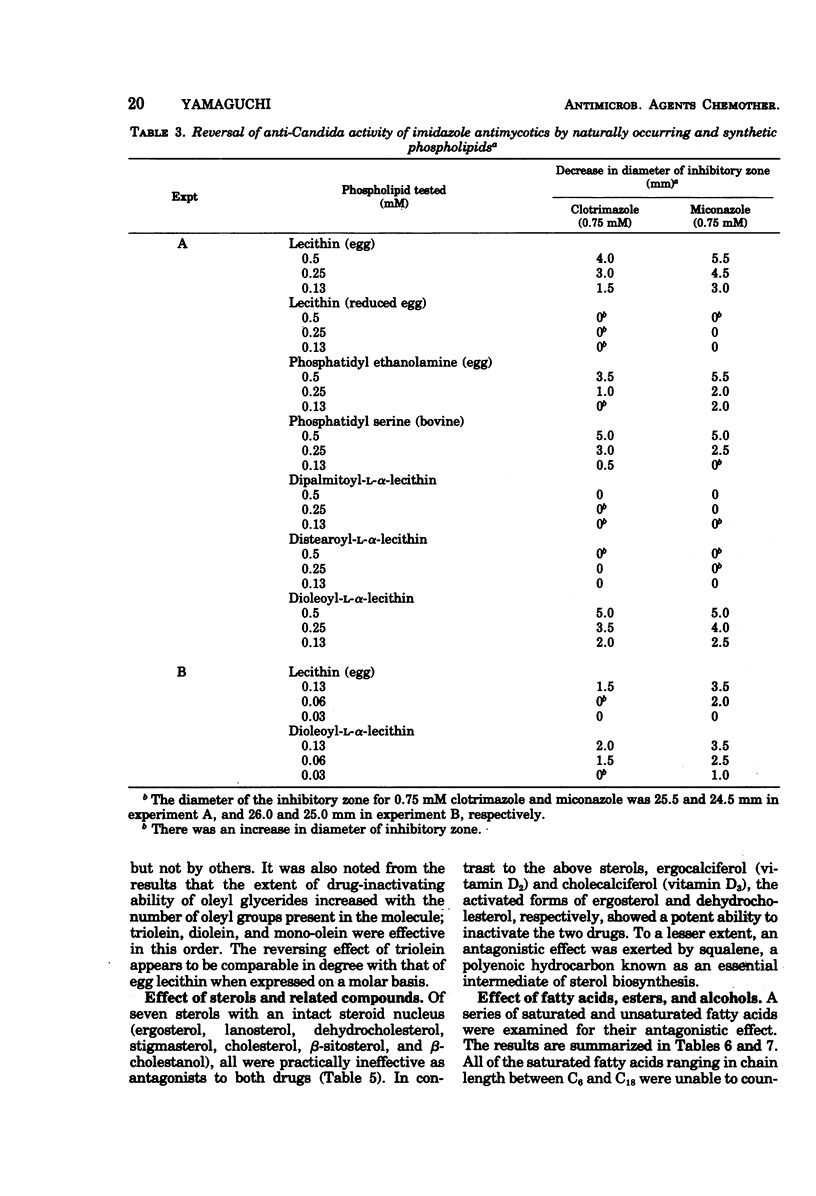
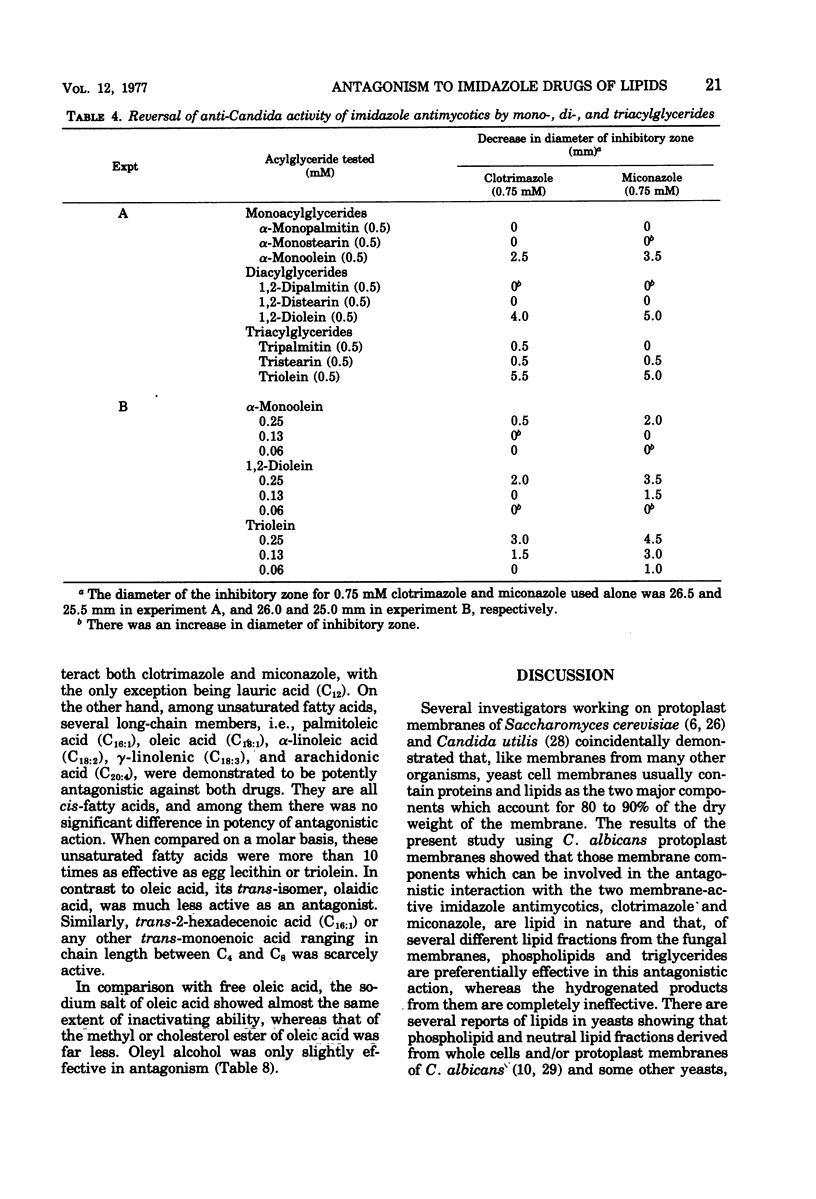
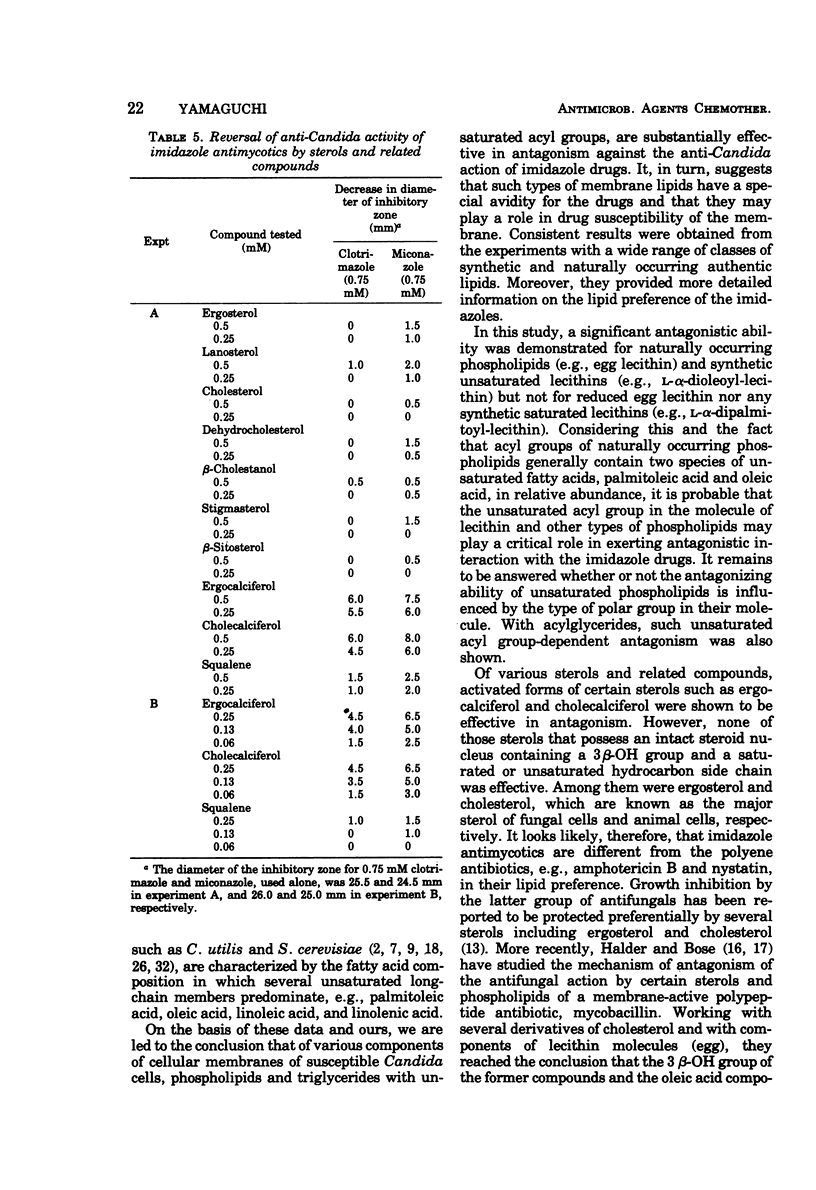
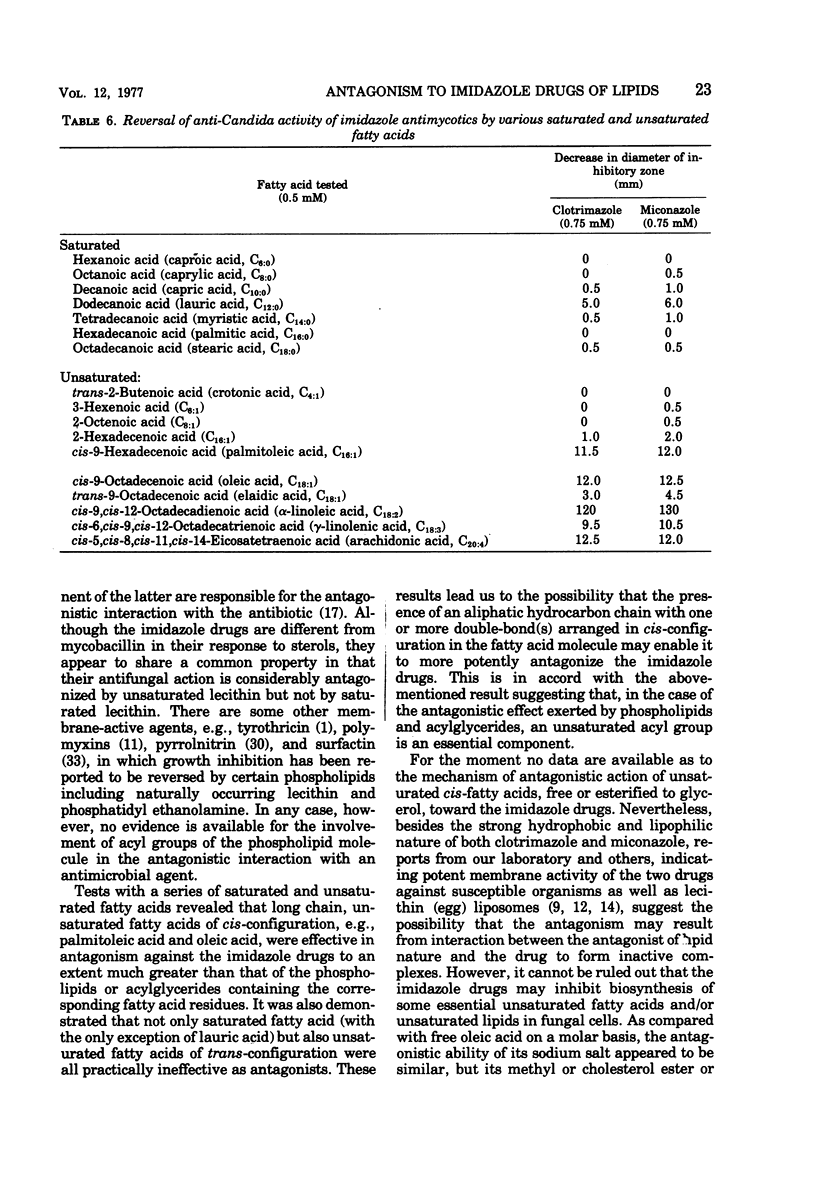
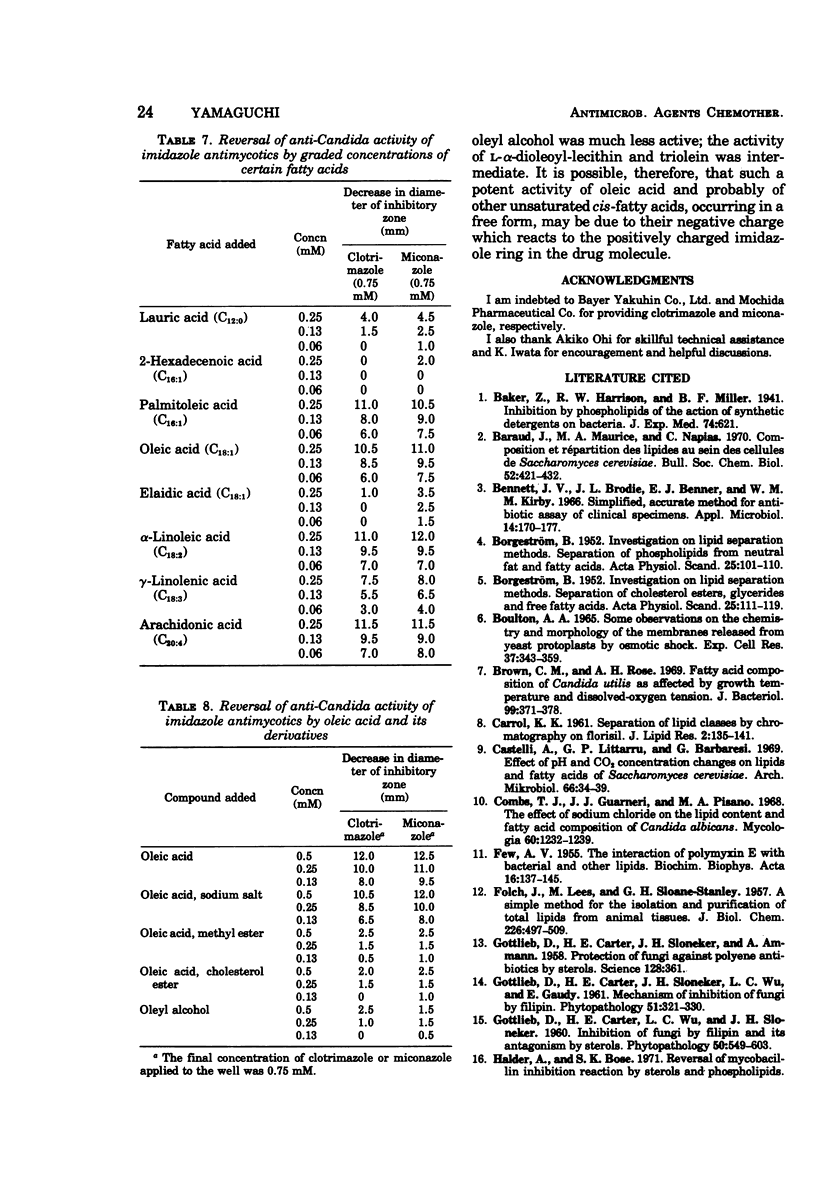
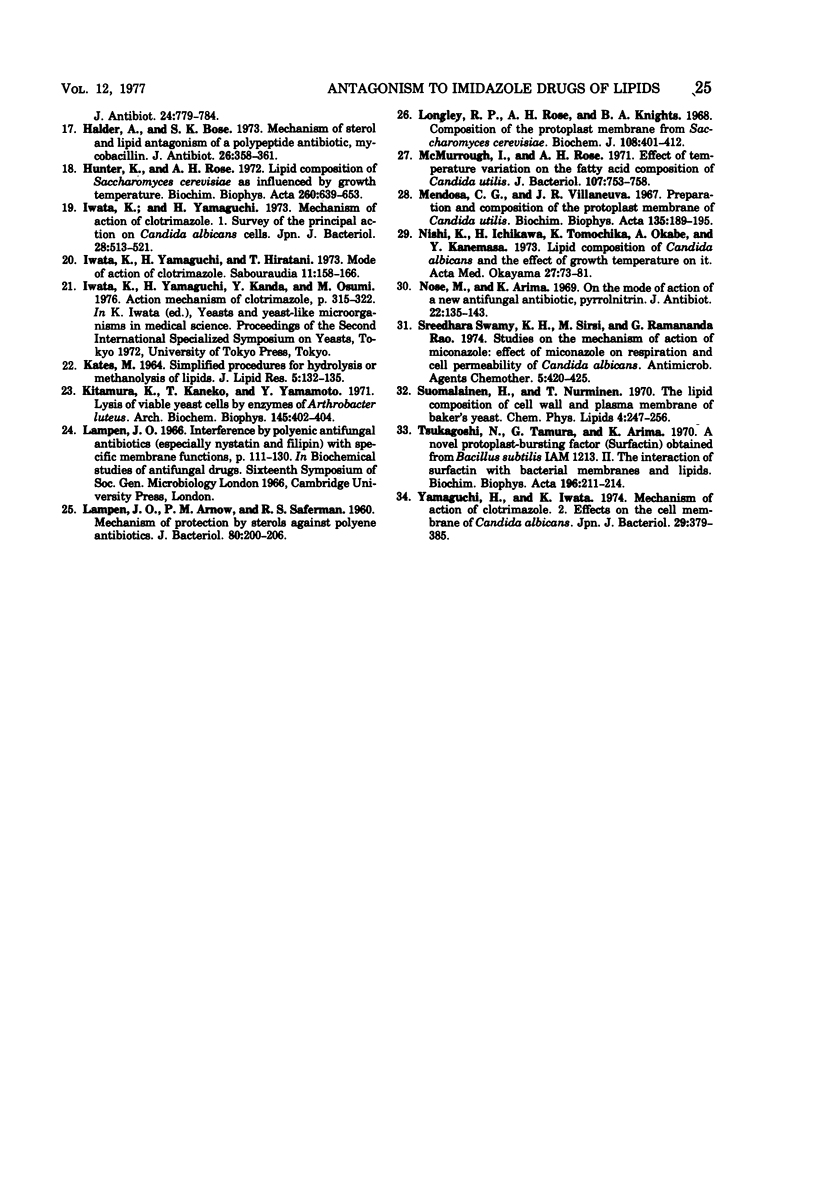
Selected References
These references are in PubMed. This may not be the complete list of references from this article.
- BOULTON A. A. SOME OBSERVATIONS ON THE CHEMISTRY AND MORPHOLOGY OF THE MEMBRANES RELEASED FROM YEAST PROTOPLASTS BY OSMOTIC SHOCK. Exp Cell Res. 1965 Feb;37:343–359. doi: 10.1016/0014-4827(65)90183-7. [DOI] [PubMed] [Google Scholar]
- Baraud J., Maurice A., Napias C. Composition et répartition des lipides au sein des cellules de Saccharomyces cerevisiae. Bull Soc Chim Biol (Paris) 1970;52(4):421–432. [PubMed] [Google Scholar]
- Bennett J. V., Brodie J. L., Benner E. J., Kirby W. M. Simplified, accurate method for antibiotic assay of clinical specimens. Appl Microbiol. 1966 Mar;14(2):170–177. doi: 10.1128/am.14.2.170-177.1966. [DOI] [PMC free article] [PubMed] [Google Scholar]
- Brown C. M., Rose A. H. Fatty-acid composition of Candida utilis as affected by growth temperature and dissolved-oxygen tension. J Bacteriol. 1969 Aug;99(2):371–378. doi: 10.1128/jb.99.2.371-378.1969. [DOI] [PMC free article] [PubMed] [Google Scholar]
- CARROLL K. K. Separation of lipid classes by chromatography on Florisil. J Lipid Res. 1961 Apr;2:135–141. [PubMed] [Google Scholar]
- Castelli A., Littarru G. P., Barbaresi G. Effect of pH and CO2 concentration changes on lipids and fatty acids of Saccharomyces cerevisiae. Arch Mikrobiol. 1969;66(1):34–39. doi: 10.1007/BF00414661. [DOI] [PubMed] [Google Scholar]
- Combs T. J., Guarneri J. J., Pisano M. A. The effect of sodium chloride on the lipid content and fatty acid composition of Candida albicans. Mycologia. 1968 Nov-Dec;60(6):1232–1239. [PubMed] [Google Scholar]
- FEW A. V. The interaction of polymyxin E with bacterial and other lipids. Biochim Biophys Acta. 1955 Jan;16(1):137–145. doi: 10.1016/0006-3002(55)90191-8. [DOI] [PubMed] [Google Scholar]
- FOLCH J., LEES M., SLOANE STANLEY G. H. A simple method for the isolation and purification of total lipides from animal tissues. J Biol Chem. 1957 May;226(1):497–509. [PubMed] [Google Scholar]
- Halder A., Bose S. K. Reversal of mycobacillin inhibition reactions by sterols and phosholipids. J Antibiot (Tokyo) 1971 Nov;24(11):779–784. doi: 10.7164/antibiotics.24.779. [DOI] [PubMed] [Google Scholar]
- Hunter K., Rose A. H. Lipid composition of Saccharomyces cerevisiae as influenced by growth temperature. Biochim Biophys Acta. 1972 Apr 18;260(4):639–653. doi: 10.1016/0005-2760(72)90013-6. [DOI] [PubMed] [Google Scholar]
- Iwata K., Yamaguchi H., Hiratani T. Mode of action of clotrimazole. Sabouraudia. 1973 Jul;11(2):158–166. doi: 10.1080/00362177385190321. [DOI] [PubMed] [Google Scholar]
- Iwata K., Yamaguchi H. [Mechanism of action of clotrimazole. I. Study of the principal action on Candida albicans]. Nihon Saikingaku Zasshi. 1973 Nov;28(6):513–521. [PubMed] [Google Scholar]
- KATES M. SIMPLIFIED PROCEDURES FOR HYDROLYSIS OR METHANOLYSIS OF LIPIDS. J Lipid Res. 1964 Jan;5:132–135. [PubMed] [Google Scholar]
- Kitamura K., Kaneko T., Yamamoto Y. Lysis of viable yeast cells by enzymes of Arthrobacter luteus. Arch Biochem Biophys. 1971 Jul;145(1):402–404. doi: 10.1016/0003-9861(71)90053-1. [DOI] [PubMed] [Google Scholar]
- LAMPEN J. O., ARNOW P. M., SAFFERMAN R. S. Mechanism of protection by sterols against polyene antibiotics. J Bacteriol. 1960 Aug;80:200–206. doi: 10.1128/jb.80.2.200-206.1960. [DOI] [PMC free article] [PubMed] [Google Scholar]
- Longley R. P., Rose A. H., Knights B. A. Composition of the protoplast membrane from Saccharomyces cerevisiae. Biochem J. 1968 Jul;108(3):401–412. doi: 10.1042/bj1080401. [DOI] [PMC free article] [PubMed] [Google Scholar]
- McMurrough I., Rose A. H. Effects of temperature variation on the fatty acid composition of Candida utilis. J Bacteriol. 1971 Sep;107(3):753–758. doi: 10.1128/jb.107.3.753-758.1971. [DOI] [PMC free article] [PubMed] [Google Scholar]
- Mendoza C. G., Villanueva J. R. Preparation and composition of the protoplast membrane of Candida utilis. Biochim Biophys Acta. 1967 May 2;135(2):189–195. doi: 10.1016/0005-2736(67)90113-7. [DOI] [PubMed] [Google Scholar]
- Nishi K., Ichikawa H., Tomochika K., Okabe A., Kanemasa Y. Lipid composition of Candida albicans and effect of growth temperature on it. Acta Med Okayama. 1973 Aug;27(3):73–81. [PubMed] [Google Scholar]
- Nose M., Arima K. On the mode of action of a new antifungal antibiotic, pyrrolnitrin. J Antibiot (Tokyo) 1969 Apr;22(4):135–143. doi: 10.7164/antibiotics.22.135. [DOI] [PubMed] [Google Scholar]
- Sreedhara Swamy K. H., Sirsi M., Ramananda Rao G. R. Studies on the mechanism of action of miconazole: effect of miconazole on respiration and cell permeability of Candida albicans. Antimicrob Agents Chemother. 1974 Apr;5(4):420–425. doi: 10.1128/aac.5.4.420. [DOI] [PMC free article] [PubMed] [Google Scholar]
- Tsukagoshi N., Tamura G., Arima K. A novel protoplast-bursting factor (surfactin) obtained from bacillus subtilis IAM 1213. II. The interaction of surfactin with bacterial membranes and lipids. Biochim Biophys Acta. 1970;196(2):211–214. doi: 10.1016/0005-2736(70)90008-8. [DOI] [PubMed] [Google Scholar]
- Yamaguchi H., Iwata K. [Mechanisl of action of clotrimazole. 2. Effects on the cell membrane of Candida albicans]. Nihon Saikingaku Zasshi. 1974 Mar;29(2):379–385. [PubMed] [Google Scholar]


